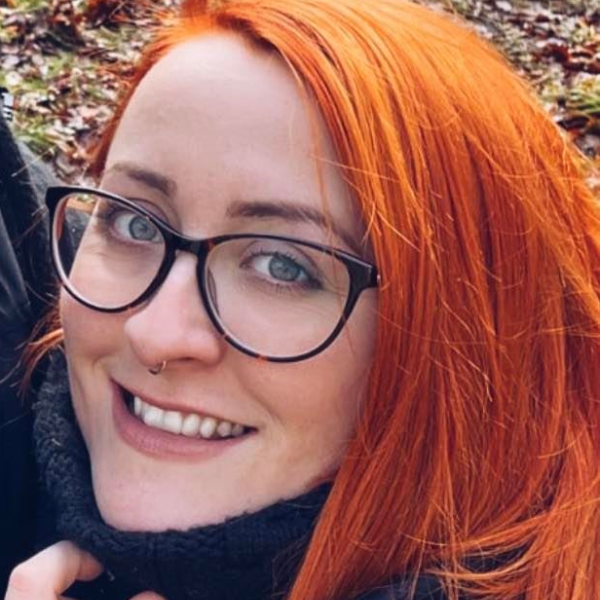
Meet the Expert: Dr Alice Cree
Welcome to 'Meet the Expert', our series bringing you informative interviews with Armed Forces researchers, policy makers and service providers. Read on to learn about current work, aspirations for progress and future work, and for insights into expert perspectives on key issues impacting ex-Service personnel and their families.
 In this issue we interviewed Dr Alice Cree, who is a Newcastle University Academic Track (NUAcT) Research Fellow in the School of Geography, Politics & Sociology at Newcastle University. Dr Cree’s current work uses participatory creative methods to examine gendered military experience, particularly with women veterans and military partners and mobilising creative methodological approaches to personal and political encounters.
In this issue we interviewed Dr Alice Cree, who is a Newcastle University Academic Track (NUAcT) Research Fellow in the School of Geography, Politics & Sociology at Newcastle University. Dr Cree’s current work uses participatory creative methods to examine gendered military experience, particularly with women veterans and military partners and mobilising creative methodological approaches to personal and political encounters.
1. Dr Alice Cree, please tell us about your background and how you came to be involved in work relating to the Armed Forces Community.
I grew up in the military city of Plymouth, and my father taught at Britannia Royal Naval College in Dartmouth for many years; so I have always been surrounded by “military people.” When I was a Geography undergraduate student in my early twenties, I met a soldier who served in the Coldstream Guards while I was home for the summer – a chance encounter in a dodgy Plymouth bar that ended up changing the course of my whole life. We became good friends and over the next few years the experiences he shared with me about life in the Army, his time serving in Afghanistan and so on, made a deep and lasting impression on me. I later got to know his sister, who was a submariner’s wife and a member of the Military Wives Choir. The relationships I had with them were so important in terms of the direction that my research ultimately took as I started out in academia. My research interests lie at the intersection between Critical Military Studies (CMS) and feminist geopolitics, and in particular using participatory and creative methods to centre the lived experiences of military communities in CMS research.
2. What research projects are you currently working on and how do they fit into the bigger picture of understanding and supporting the Armed Forces Community?
I have recently completed work on an Economic and Social Research Council (ESRC) funded project titled Conflict, Intimacy, and Military Wives. My role was as Principal Investigator, working alongside Dr Hannah West (Research Associate, now at Cardiff University) and Workie Ticket Theatre CIC, which is a feminist theatre organisation based in North Tyneside. Drawing on interviews, focus groups, and a series of theatre-based workshops with a group of 38 military partners, ex-partners, and widows, the research shed light on the long-term consequences of war and military service on personal relationships between Armed Forces personnel and their spouses and families. The final output of the project was our play ‘Magnolia Walls’ (written by JoJo Kirtley with Alice Cree and directed by Corinne Kilvington) which was performed in June last year at Northern Stage in Newcastle Upon Tyne. The play highlighted some of the key themes and issues that emerged from the research and tackled difficult topics such as domestic abuse, trauma, Post-traumatic stress disorder (PTSD), suicide, and racism. It also exposed the isolation and lack of community support experienced by many military spouses and partners, most of whom are women. By using theatre as our core research method, our goal was for our participants to be able to tell their own stories in the way that they wanted. This is something that we felt was particularly important for our participant group of military spouses, who can often feel like they lack agency and power in their lives. You can read more about the Conflict & Intimacy project here.
Currently, I am working on an Arts and Humanities Research Council (AHRC) standard grant bid, in collaboration with Dr Nick Caddick (Anglia Ruskin University), Dr Hannah West (Cardiff University), and the Imperial War Museum. Watch this space!
3. What other research or policy areas relating to the Armed Forces Community are you especially passionate about or feel need further attention? Please expand on this and tell us about them, as much as you can.
A recurring theme throughout much of my current and planned future research is a focus on exploring hidden (and even critical) stories and experiences from within military communities, particularly from the perspective of military families. For example, one of the military spouses we interviewed for the Conflict & Intimacy project told us:
“...the nature of what you’re talking about wanting to explore is very private and personal. What you may uncover is stuff that may be quite dark and quite upsetting and quite traumatic. The army does not want that to be remotely public. They don’t want people to know if you’re a military spouse this is the impact it may have on your relationship with your partner or on your sex life or on how you communicate with each other or on your children or all these variables because they don’t want it to be negative. They don’t want negative attention... But that only makes what you’re looking to explore more valid and more important because no one is doing that, are they? It’s hidden.”
(Extract from interview with Sophie, Army wife, April 2021).
I am really passionate about work which sheds light on these aspects of life in Armed Forces families that have typically remained hidden, and not talked about. For me, this means refusing to shy away from research areas and debates that might feel difficult, uncomfortable, or even challenging to military institutions.
4. What are your future aspirations for impacting and utilising your work/research?
My approach to research impact is to embed it from the outset using a participatory research design. Having a shared “impact-related” creative goal that all members of the project can collectively work towards is really important for my research. In the Conflict & Intimacy project, for example, this shared aim was to produce a play that would contribute to the public conversation about the long-term consequences of war and military service on Armed Forces families. In future projects, I want to use this same participatory model to continue to shed light on hidden stories from the Armed Forces community, in the hopes of contributing to better societal understanding of military life, and improved support provision for military families.
5. What do you think are the key challenges impacting current military families, and how do you think research and/or policy can be best used to address them?
One of our findings from the Conflict & Intimacy project was that the wars in Iraq and Afghanistan continue to affect military families, even when the serving person had not been deployed there themselves or had joined the military more recently. The lasting impacts of the conflicts on the mental and physical health of veterans are widely recognised, but our participants felt that they had seen little to no acknowledgement of the continued psychological burden of Iraq and Afghanistan deployments on military spouses, and the apprehension associated with the potential for future deployments. The chilling footage of casualties returning home via Royal Wootton Bassett, whilst traumatic for the families whose partners were serving there at this time, extended a sense of what might still come for military families that resurfaces every time the news suggests the potential for another deployment of British Forces at scale. While this is arguably not one of the most pressing challenges for current military families, it is nevertheless one that is important to recognise. However, more research on this is needed.
6. Can you tell us about the methods you tend to use in your research, and why you gravitate towards these kinds of approaches?
I am a qualitative researcher, but my specific expertise is in the use of creative and participatory methods. Creativity can help make the research process more interesting and meaningful to participants (and therefore make participant recruitment much easier), because at a very basic level- creative methods are fun! They often involve collaboration with artists and other creative partners, which in turn can give way to new ways of thinking about the research and enrich the data that you produce. Most importantly, creative ways of doing research can help to destabilise the binary between “the researcher” and “the researched” and attribute all members of the project with equal agency and autonomy over the research process. I recently edited a book on Creative Methods in Military Studies, which is coming out next month with Rowman & Littlefield. The collection brings together authors working at the cutting edge of creative research in military studies, to explore how creativity and creative practice can shed new light on often taken-for-granted concepts in critical military research.
7. Given unlimited funding and time, what would be your dream piece of research to undertake involving the Armed Forces community?
I would love to do an international, theatre-based piece of research that explores experiences of military motherhood (mothers in the military, and mothers of those in the military). That is the dream!
Many thanks to Dr Alice Cree for sharing her insights.
Catch us next month for another interesting and informative interview with an expert from the Armed Forces research community.